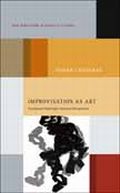 EDGAR LANDGRAF
EDGAR LANDGRAFIMPROVISATION AS ART
Conceptual Challenges, Historical Perspectives
Continuum, 21/7/2011
Series: New Directions in German Studies
Improvisation as Art traces how modernity’s emphasis on inventiveness has changed the meaning of improvisation; and how the ideals and laws that led improvisation to be banned from “high art” in the eighteenth century simultaneously enabled the inventive reintegration of improvisation into modernism.
After an in-depth exploration of contemporary theoretical contentions surrounding improvisation, Landgraf examines how the new emphasis on inventiveness affects the understanding of improvisation in the emerging aesthetic and anthropological discourses of the late 18th and early 19th centuries. He first focuses on accounts of improvisational performances by Moritz, Goethe, and Fernow and reads them alongside the aesthetics of autonomy as it develops at the same time. In its second half, the book investigates how the problem of “planning” art receives a different treatment in German Romanticism. The final chapter focuses on the writings of Heinrich von Kleist where improvisation presents a central aesthetic principle. Kleist’s figurations of improvisation recognize the anthropological predicament of the self in modern society and the social constraints that invite and often force individuals to improvise.